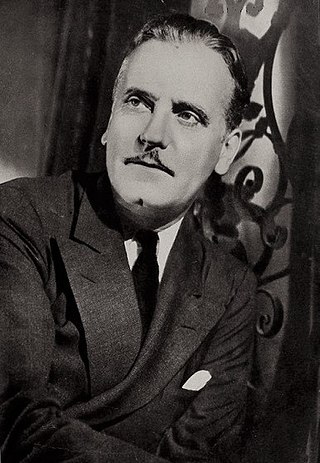Related Research Articles

Charles Sherman Ruggles was an American comic character actor. In a career spanning six decades, Ruggles appeared in close to 100 feature films, often in mild-mannered and comic roles. He was also the elder brother of director, producer, and silent film actor Wesley Ruggles (1889–1972).

Edwin Maxwell was an Irish character actor on in Hollywood movies of the 1930s and 1940s, frequently cast as shady businessmen and shysters, though often ones with a pompous or dignified bearing. Prior to that, he was an actor on the Broadway stage and a director of plays.

Gertrude Maud Barnes, known professionally as Binnie Barnes, was an English actress whose career in films spanned from 1923 to 1973.

Pandro Samuel Berman, also known as Pan Berman, was an American film producer.

Mantan Moreland was an American actor and comedian most popular in the 1930s and 1940s. He starred in numerous films. His daughter Marcella Moreland appeared as a child actress in several films.

George Meeker was an American character film and Broadway actor.
Ian Dalrymple was a British screenwriter, film director, film editor and film producer.

Raphael Kuhner Wuppermann, known professionally as Ralph Morgan, was a Hollywood stage and film character actor, and union activist. He was a brother of actor Frank Morgan as well as the father of actress Claudia Morgan.

Kenneth Macgowan was an American film producer. He won an Academy Award for Best Color Short Film for La Cucaracha (1934), the first live-action short film made in the three-color Technicolor process.

Clarence Muse was an American actor, screenwriter, director, singer, and composer. He was the first African American to appear in a starring role in a film, 1929's Hearts in Dixie. He acted for 50 years, and appeared in more than 150 films. He was inducted into the Black Filmmakers Hall of Fame in 1973.

Samuel Bischoff was an American film producer who was responsible for more than 400 full-length films, two-reel comedies, and serials between 1922 and 1964.

Flournoy Eakin Miller, sometimes credited as F. E. Miller, was an American entertainer, actor, lyricist, producer and playwright. Between about 1905 and 1932 he formed a popular comic duo, Miller and Lyles, with Aubrey Lyles. Described as "an innovator who advanced black comedy and entertainment significantly," and as "one of the seminal figures in the development of African American musical theater on Broadway", he wrote many successful vaudeville and Broadway shows, including the influential Shuffle Along (1921), as well as working on several all-black movies between the 1930s and 1950s.

Tempe Pigott was an Australian silent and sound screen character actress. In the pre-film era she was a stage actress in England, Australia, Canada and the United States. She began appearing in motion pictures in the 1920s.
Maury Cohen, also known as Maury M. Cohen, was an American film producer most active during the 1930s. He owned one of the Poverty Row studios, Invincible films, which specialized in making low-budget feature films. After leaving film in the early 1940s, Cohen founded and ran the historic dance club in Los Angeles, the Hollywood Palladium.
Tremlet C. Carr was an American film producer, closely associated with the low-budget filmmaking of Poverty Row. In 1931 he co-founded Monogram Pictures, which developed into one of the leading specialist producers of B pictures in Hollywood.

Lionel John Monagas was an American actor originally from Caracas, Venezuela. A member of the original Lafayette Players company of Harlem, he appeared in theatrical and film productions.
Alfred N. Sack was an American businessperson, newspaper publisher and the proprietor of film distribution, production, and the theater-owning business Sack Amusements in the United States.. He collaborated with Spencer Williams to make films with Black casts. Sack Amusement Enterprises was the leading distributor of this type of film between 1920 and 1950.
William M. Pizor (1890–1959) was a pioneering film producer who also had a distribution company, Imperial Distributing Corporation. He was also president of production company Imperial Pictures. His son Irwin Pizor succeeded him in the film business.
Irwin Richard Franklyn (1904–1966) was an American film director, film producer, screenwriter, novelist, and publicist. He wrote novelizations of films including Flight: An Epic of the Air for Frank Capra's film. He is also known as Irwin R. Franklin.
Milton Woods was an actor. He was in several films. In 1946, Newsweek described him as the "colored Basil Rathbone". In 1951, Jet reported that he directed of the American Negro Repertory Theater, touring the country in a trailer.
References
- 1 2 3 4 5 Weisenfeld, Judith (November 20, 2007). Hollywood be Thy Name: African American Religion in American Film, 1929-1949. University of California Press. ISBN 9780520227743 – via Google Books.
- ↑ "Negro Digest". Negro Digest Publishing Company. November 20, 1945 – via Google Books.
- ↑ Rollins, Peter C. (July 11, 2014). Hollywood As Historian: American Film in a Cultural Context. University Press of Kentucky. ISBN 9780813148649 – via Google Books.
- ↑ McGee, Mark Thomas. "Talk's Cheap, Action's Expensive - the Films of Robert L. Lippert".